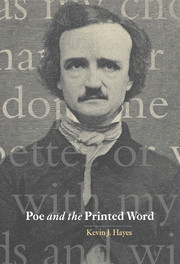Book contents
- Frontmatter
- Contents
- Preface
- List of abbreviations
- 1 The student and the book
- 2 Poetry in manuscript and print
- 3 Baltimore book culture
- 4 Booksellers' banquet
- 5 The novel
- 6 Poe's library
- 7 Cheap books and expensive magazines
- 8 The road to Literary America
- Conclusion
- Notes
- Bibliography
- Index
- Titles in the series
3 - Baltimore book culture
Published online by Cambridge University Press: 09 November 2009
- Frontmatter
- Contents
- Preface
- List of abbreviations
- 1 The student and the book
- 2 Poetry in manuscript and print
- 3 Baltimore book culture
- 4 Booksellers' banquet
- 5 The novel
- 6 Poe's library
- 7 Cheap books and expensive magazines
- 8 The road to Literary America
- Conclusion
- Notes
- Bibliography
- Index
- Titles in the series
Summary
Read, at a stall (for oft one pops
On something at these stalls and shops,
That does to quote, and gives one's Book
A classical and knowing look. –
Indeed I've found, in Latin, lately,
A course of stalls improves me greatly)
–Thomas Moore, “The Fudge Family in Paris”In mid-1829, a time after he had received his discharge from the army yet before he had been accepted to West Point, Edgar Allan Poe was living in Baltimore with virtually no money and little else but the clothes on his back. In the second week of August he wrote to John Allan with a request: “I left behind me in Richmond a small trunk containing books and some letters – will you forward it on to Baltimore to the care of H-W. Bool Jr and if you think I may ask so much perhaps you will put in it for me some few clothes as I am nearly without.” Henry W. Bool, Jr., was a book dealer who had been living and working in Baltimore for many years. A mutual acquaintance recalled, “He was a Northern man, and settled in Baltimore in the capacity of vendor of second-hand books. His magasin was a cellar, and his assortment of mutilated tomes elicited much attention on the part of the antiquarian book-worm.”
Since coming to Baltimore in or before 1820, Bool had actively engaged in many aspects of the book trade.
- Type
- Chapter
- Information
- Poe and the Printed Word , pp. 30 - 44Publisher: Cambridge University PressPrint publication year: 2000



